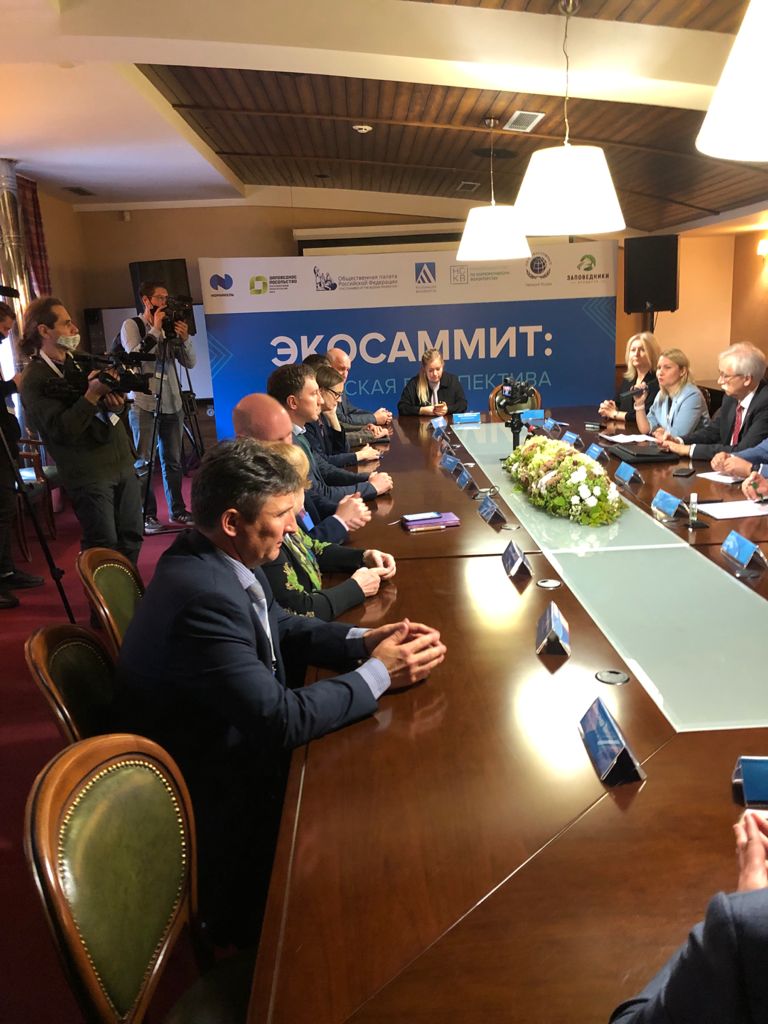

France intends to integrate biodiversity issues into the value chain or production, supply or investment decisions. Victoria Quiri, Head of the European Bureau, EcoTourism Expert, spoke at the Siberian Perspective EcoSummit about how the state organizes the protection of biodiversity in the country. The event took place in Krasnoyarsk on October 1-2.
The participants discussed biodiversity conservation and the role that corporate volunteering plays. They also exchanged experience in biodiversity conservation within the framework of business development.
In her speech, the Head of the European bureau, EcoTourism Expert, Victoria Quiri noted that more than 180,000 animal species are registered in France, that is, 10% of the known species on the planet. In addition, about 600 new species are discovered annually in France.
Species protected in France under EU law are protected by the Habitats Directive (conservation of natural habitats and wild fauna and flora) and the Birds Directive (conservation of wild birds). The first has 2500 species of animals in its list, and within the second, about 500 species of wild birds are under protection. Of these, 416 species of fauna are protected by EU legislation in France, 20 species of animals are unique to France.
Biodiversity in France is protected by a government agency, the French Agency for Biodiversity (Office français pour la biodiversité, OFB), which is under the tutelage of the French Environment and Agriculture ministers. The organization encourages firms and helps companies, local authorities, nongovernmental organizations and nature users to take part in protecting biodiversity.
To this end, the agency is introducing schemes aimed at solving environmental problems in various sectors. Thus, within the framework of the Commitment to Nature initiative, the private sector operates such schemes as “Enterprises Committed to Nature”, “Companies Committed to Nature”, “Act4Nature France”. This scheme provides a means to help stakeholders to better integrate biodiversity conservation into their activities.
The “Companies Committed to Nature - act4nature France” program aims to identify, recognize and promote organizational action plans in favor of biodiversity conservation, as they directly or indirectly have a significant impact on flora and fauna and depend on a number of natural resources. According to a working paper from the Central Bank of France (Banque de France) published in August, 42% of the assets of French financial institutions are highly dependent at least on one ecosystem resource (pollination, water supply, soil fertility).
In this regard, it is necessary to take into account the impact of companies on the environment and encourage them to act in favor of nature conservation and, as a consequence, biodiversity. To do this, they need to:
-Integrate biodiversity issues into the value or production chain, supply chain or even investment decisions
-Act directly in regard to biodiversity
-Support and train employees, customers, suppliers and partners to raise awareness of the dangers of biodiversity loss
-Disseminate information and share experiences and best practices.
In France, «green» operations can generate significant benefits and capital gains for companies. For example, by:
-Ensuring the security of supply chains of raw materials and cost optimization
-Providing access to finance that increasingly includes environmental criteria
-Increase visibility by responding to growing environmental concerns and demands of consumers and customers
-Adopting innovation, drawing inspiration from nature (biomimicry)
To date, 57 companies in France have submitted action plans to integrate biodiversity protection into their practices and businesses.
These companies occupy different business niches, have different staff and operate in different regions of France. The measures taken are aimed, in particular, at combating habitat transformation and climate change. Of these, 40% are related to big business.
Other conservation organizations are also working with the private sector to conserve biodiversity. Thus, on September 8, WWF France announced the launch of the Natural Capital Laboratory with the participation of four companies: Carrefour, GRDF, the Bel group and the Rocher group.
This strategy is to promote the emergence and implementation of new governance instruments - financial and extrabudgetary - focused on conserving natural capital. In particular, this is support and financial assistance to local PAs, farmers and agrarians who aim to preserve nature.
Biodiversity is usually handled by companies at the local level - for example, it can relate to soil and water conservation, ecological design of certain areas and natural space management, in addition, companies are engaged in the restoration of agricultural landscapes to preserve local flora and fauna.
At the moment, many business owners are increasingly taking initiatives in favor of biodiversity conservation, said Quiri. However, this problem cannot be solved by just one sector - it needs to be addressed comprehensively, she added.
It was also discussed that in addition to interacting with local business, which is responsible for the zones in which it operates, it is necessary to engage and educate the local population and also develop volunteer projects and public “green” movements.
The Siberian Perspective Eco-Summit was organized by Norilsk Nickel with the support of the National Council for Corporate Volunteering, the Association of Russian Managers and the Zapovednoye Embassy Charitable Foundation.
It was attended by Deputy Minister of Ecology and Rational Nature Management of the Krasnoyarsk Territory Alexander Nogin, head of the project office of the National Project "Ecology" of the Ministry of Natural Resources of Russia Lyudmila Poplavskaya, director of the Center for Corporate Social Responsibility, Institute "Graduate School of Management" of St. Petersburg State University Yuri Blagov, Vice President for Ecology and industrial safety of the company "Nornickel" Stanislav Seleznev, Head of Sustainable Development Leroy Merlin Vostok Asya Wildt, Head of HSE, Cryogas-Vysotsk (NOVATEK Group of Companies) Alexey Yezupenok, Chairman of the RuGBC Green Building Council, Great Britain Guy Eames, Director of the Daursky Reserve Alexey Cherepitsyn, Chairman of the Board of Project Arctic Development Office Nikolay Doronin, Executive Director, UN Global Compact National Network Association in Russia Marina Vashukova, representatives of the Ecological Chamber of Russia, Rosatom and the scientific community.
